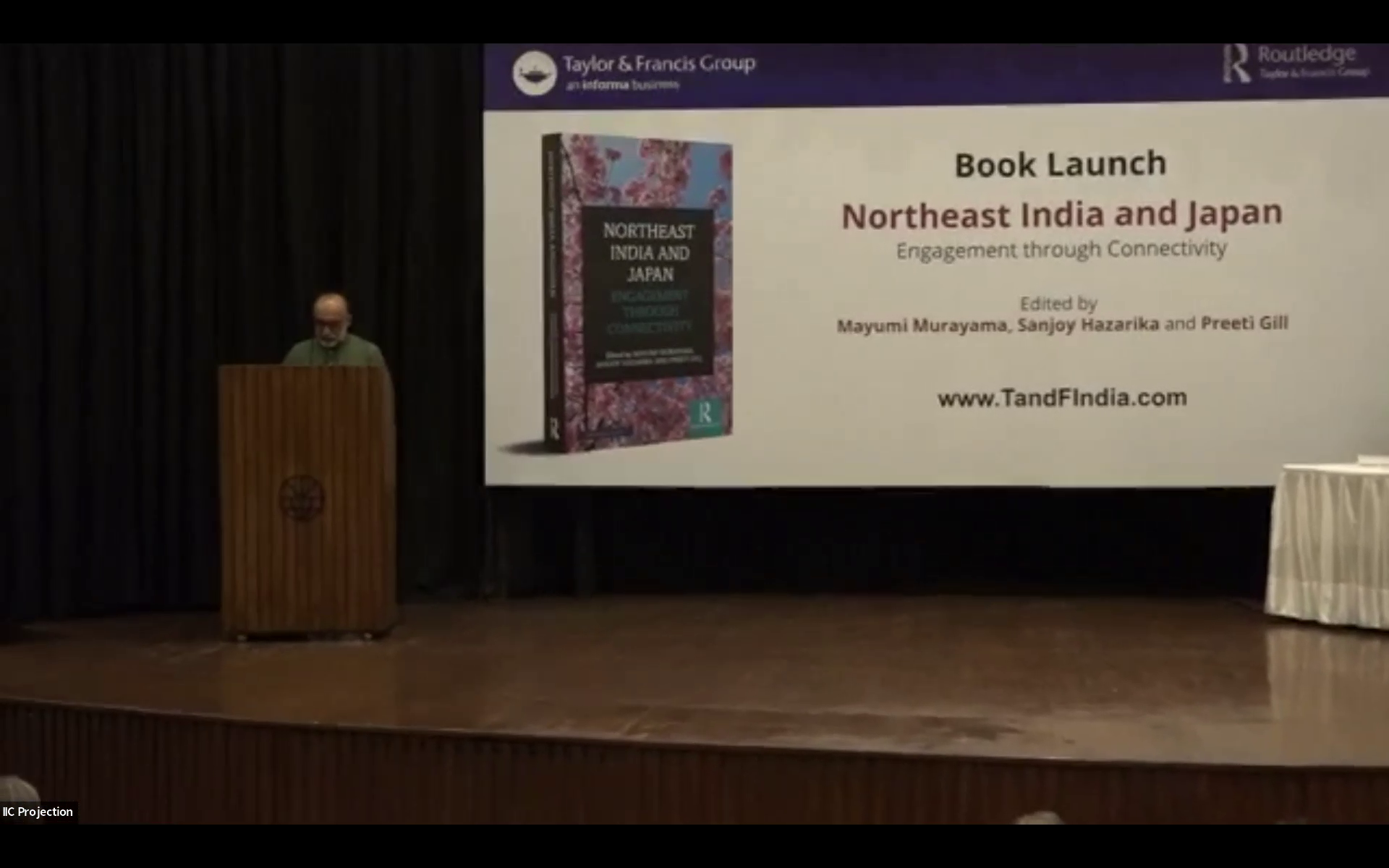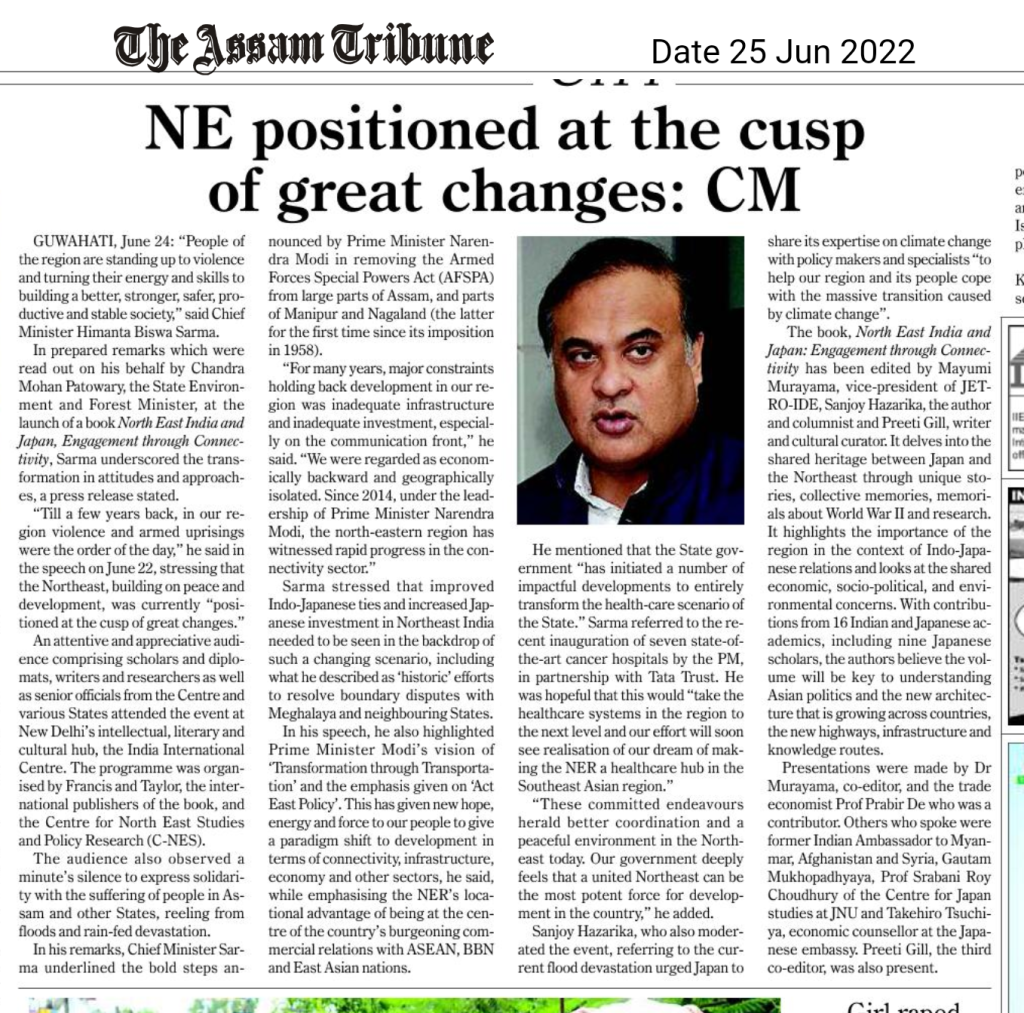
Press Coverage – Book Launch
NE Positioned at the cusp of great changes: CM

GUWAHATI, June 24: “People of the region are standing up to violence and turning their energy and skills to building a better, stronger, safer, pro¬ductive and stable society,” said Chief Minister Himanta Biswa Sarma. In prepared remarks which were read out on his behalf by Chandra Mohan Patowary, the State Environ¬ment and Forest Minister, at the launch of a book North East India and Japan, Engagement through Connec-tivity, Sarma underscored the trans¬formation in attitudes and approach¬es, a press release stated.
“Till a few years back, in our re¬gion violence and armed uprisings were the order of the day,” he said in the speech on June 22, stressing that the Northeast, building on peace and development, was currently “posi¬tioned at the cusp of great changes.” An attentive and appreciative audi¬ence comprising scholars and diplo-mats, writers and researchers as well as senior officials from the Centre and various States attended the event at New Delhi’s intellectual, literary and cultural hub, the India International Centre. The programme was organ¬ised by Francis and Taylor, the inter-national publishers of the book, and the Centre for North East Studies and Policy Research (C-NES).
The audience also observed a minute’s silence to express solidari¬ty with the suffering of people in As¬sam and other States, reeling from floods and rain-fed devastation.
In his remarks, Chief Minister Sar¬ma underlined the bold steps announced by Prime Minister Naren¬dra Modi in removing the Armed Forces Special Powers Act (AFSPA) from large parts of Assam, and parts of Manipur and Nagaland (the latter for the first time since its imposition in 1958).
“For many years, major constraints holding back development in our re¬gion was inadequate infrastructure and inadequate investment, especial-ly on the communication front,” he said. “We were regarded as econom¬ically backward and geographically isolated. Since 2014, under the lead¬ership of Prime Minister Narendra Modi, the north-eastern region has witnessed rapid progress in the con¬nectivity sector.”
Sarma stressed that improved Indo-Japanese ties and increased Jap¬anese investment in Northeast India needed to be seen in the backdrop of such a changing scenario, including what he described as ‘historic’ efforts to resolve boundary disputes with Meghalaya and neighbouring States. In his speech, he also highlighted Prime Minister Modi’s vision of ‘Transformation through Transporta¬tion’ and the emphasis given on ‘Act East Policy’. This has given new hope, energy and force to our people to give a paradigm shift to development in terms of connectivity, infrastructure, economy and other sectors, he said, while emphasising the NER’s loca-tional advantage of being at the cen¬tre of the country’s burgeoning com¬mercial relations with ASEAN, BBN and East Asian nations.
He mentioned that the State gov¬ernment “has initiated a number of impactful developments to entirely transform the health-care scenario of the State.” Sarma referred to the re¬cent inauguration of seven state-of-the-art mncer hospitals by the PM, in partnership with Tata Trust. He was hopeful that this would “take the healthcare systems in the region to the next level and our effort will soon see realisation of our dream of mak-ing the NER a healthcare hub in the Southeast Asian region.”
“These committed endeavours herald better coordination and a peaceful environment in the North¬east today. Our government deeply feels that a united Northeast can be the most potent force for develop¬ment in the country,” he added. Sanjoy Hazarika, who also moder¬ated the event, referring to the cur¬rent flood devastation urged Japan to share its expertise on climate change with policy makers and specialists “to help our region and its people cope with the massive transition caused by climate change”.
The book, North East India and Japan: Engagement through Connec¬tivity has been edited by Mayumi Murayama, vice-president of JET¬RO-IDE, Sanjay Hazarika, the author and columnist and Preeti Gill, writer and cultural curator. It delves into the shared heritage between Japan and the Northeast through unique sto¬nes, collective memories, memori¬als about World War II and research. It highlights the importance of the region in the context of Indo-Japa¬nese relations and looks at the shared economic, socio-political, and envi¬ronmental concerns. With contribu¬tions from 16 Indian and Japanese ac-ademics, including nine Japanese scholars, the authors believe the vol¬ume will be key to understanding Asian politics and the new architec¬ture that is growing across countries, the new highways, infrastructure and knowledge routes.
Presentations were made by Dr Murayama, co-editor, and the trade economist Prof Prabir De who was a contributor. Others who spoke were former Indian Ambassador to Myan¬mar, Afghanistan and Syria, Gautam Mukhopadhyaya, Prof Srabani Roy Choudhury of the Centre for Japan studies at JNU and Takehiro Tsuchiya, economic counsellor at the Japa¬nese embassy. Preeti Gill, the third co-editor, was also present.